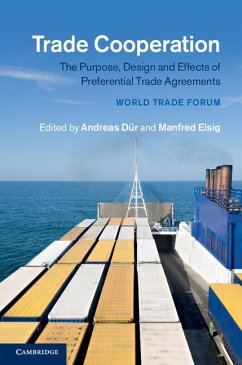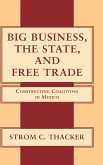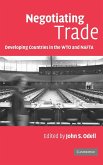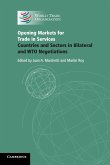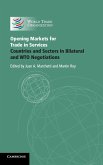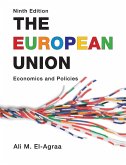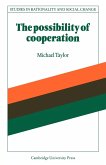Trade Cooperation
Herausgeber: Dür, Andreas; Elsig, Manfred
Trade Cooperation
Herausgeber: Dür, Andreas; Elsig, Manfred
- Gebundenes Buch
- Merkliste
- Auf die Merkliste
- Bewerten Bewerten
- Teilen
- Produkt teilen
- Produkterinnerung
- Produkterinnerung
This unique collection of original essays describes preferential trade agreements, explains why they have spread and explores their effects.
Andere Kunden interessierten sich auch für
![Big Business, The State, and Free Trade Big Business, The State, and Free Trade]() Strom C. ThackerBig Business, The State, and Free Trade104,99 €
Strom C. ThackerBig Business, The State, and Free Trade104,99 €![Negotiating Trade Negotiating Trade]() John S. Odell (ed.)Negotiating Trade104,99 €
John S. Odell (ed.)Negotiating Trade104,99 €![Opening Markets for Trade in Services Opening Markets for Trade in Services]() Opening Markets for Trade in Services71,99 €
Opening Markets for Trade in Services71,99 €![Opening Markets for Trade in Services Opening Markets for Trade in Services]() Opening Markets for Trade in Services149,99 €
Opening Markets for Trade in Services149,99 €![The Retreat of the State The Retreat of the State]() Susan StrangeThe Retreat of the State23,99 €
Susan StrangeThe Retreat of the State23,99 €![The European Union The European Union]() Ali M. El-AgraaThe European Union95,99 €
Ali M. El-AgraaThe European Union95,99 €![The Possibility of Cooperation The Possibility of Cooperation]() Michael TaylorThe Possibility of Cooperation31,99 €
Michael TaylorThe Possibility of Cooperation31,99 €-
-
-
This unique collection of original essays describes preferential trade agreements, explains why they have spread and explores their effects.
Hinweis: Dieser Artikel kann nur an eine deutsche Lieferadresse ausgeliefert werden.
Hinweis: Dieser Artikel kann nur an eine deutsche Lieferadresse ausgeliefert werden.
Produktdetails
- Produktdetails
- Verlag: Cambridge University Press
- Seitenzahl: 628
- Erscheinungstermin: 2. November 2015
- Englisch
- Abmessung: 235mm x 157mm x 38mm
- Gewicht: 1047g
- ISBN-13: 9781107083875
- ISBN-10: 1107083877
- Artikelnr.: 41612009
- Herstellerkennzeichnung
- Libri GmbH
- Europaallee 1
- 36244 Bad Hersfeld
- gpsr@libri.de
- Verlag: Cambridge University Press
- Seitenzahl: 628
- Erscheinungstermin: 2. November 2015
- Englisch
- Abmessung: 235mm x 157mm x 38mm
- Gewicht: 1047g
- ISBN-13: 9781107083875
- ISBN-10: 1107083877
- Artikelnr.: 41612009
- Herstellerkennzeichnung
- Libri GmbH
- Europaallee 1
- 36244 Bad Hersfeld
- gpsr@libri.de
1. Introduction: the purpose, design and effects of preferential trade
agreements Andreas Dür and Manfred Elsig; Part I. Why Do Countries Sign
PTAs?: 2. Technology, politics and economic exchanges: historical patterns
in international economic agreements Moonhawk Kim; 3. The political economy
of preferential trade agreements Edward D. Mansfield and Helen V. Milner;
4. Weak governments and preferential trade agreements Jean-Louis Arcand,
Marcelo Olarreaga and Laura Zoratto; 5. Natural trading partners? A public
opinion perspective on preferential trade agreements Víctor Umaña, Thomas
Bernauer and Gabriele Spilker; 6. Regionalisation in search of regionalism:
production networks and deep integration commitments in Asia's PTAs Soo
Yeon Kim; Part II. The Design of PTAs: 7. Imitation and innovation in
international governance: the diffusion of trade agreement design Leonardo
Baccini, Andreas Dür and Yoram Z. Haftel; 8. PTA design, tariffs, and
intra-industry trade Mark Manger; 9. PTAs and audiovisual services Kerry A.
Chase; 10. Competition policy and free trade: antitrust provisions in PTAs
Anu Bradford and Tim Büthe; 11. PTAs and public procurement Stephanie J.
Rickard; 12. Trade agreements, violent conflict and security Yoram Z.
Haftel; 13. Dispute settlement provisions in PTAs: new data and new
concepts Todd Allee and Manfred Elsig; Part III. The Effects of PTAs: 14.
Preliminary examination of heterogeneous effects on international trade of
economic integration agreements Scott L. Baier, Jeffrey H. Bergstrand and
Matthew W. Clance; 15. Effects of deep versus shallow trade agreements in
general equilibrium Peter Egger and Sergey Nigai; 16. Revisiting the trade
effects of services agreements Anirudh Shingal; 17. Trade agreements as
protection from risk Jeffrey Kucik; 18. What do we know about preferential
trade agreements and temporary trade barriers? Chad P. Bown, Baybars
Karacaovali and Patricia Tovar; Part IV. PTAs and the Multilateral Trading
System: 19. The dialectical relationship of preferential and multilateral
trade agreements Thomas Cottier, Charlotte Sieber-Gasser and Gabriela
Wermelinger; 20. Forget about the WTO: the network of relations between
PTAs and 'double PTAs' Joost Pauwelyn and Wolfgang Alschner; 21.
Plurilateral agreements, variable geometry and the WTO Bernard Hoekman; 22.
Referring PTA disputes to the WTO dispute settlement system James Flett.
agreements Andreas Dür and Manfred Elsig; Part I. Why Do Countries Sign
PTAs?: 2. Technology, politics and economic exchanges: historical patterns
in international economic agreements Moonhawk Kim; 3. The political economy
of preferential trade agreements Edward D. Mansfield and Helen V. Milner;
4. Weak governments and preferential trade agreements Jean-Louis Arcand,
Marcelo Olarreaga and Laura Zoratto; 5. Natural trading partners? A public
opinion perspective on preferential trade agreements Víctor Umaña, Thomas
Bernauer and Gabriele Spilker; 6. Regionalisation in search of regionalism:
production networks and deep integration commitments in Asia's PTAs Soo
Yeon Kim; Part II. The Design of PTAs: 7. Imitation and innovation in
international governance: the diffusion of trade agreement design Leonardo
Baccini, Andreas Dür and Yoram Z. Haftel; 8. PTA design, tariffs, and
intra-industry trade Mark Manger; 9. PTAs and audiovisual services Kerry A.
Chase; 10. Competition policy and free trade: antitrust provisions in PTAs
Anu Bradford and Tim Büthe; 11. PTAs and public procurement Stephanie J.
Rickard; 12. Trade agreements, violent conflict and security Yoram Z.
Haftel; 13. Dispute settlement provisions in PTAs: new data and new
concepts Todd Allee and Manfred Elsig; Part III. The Effects of PTAs: 14.
Preliminary examination of heterogeneous effects on international trade of
economic integration agreements Scott L. Baier, Jeffrey H. Bergstrand and
Matthew W. Clance; 15. Effects of deep versus shallow trade agreements in
general equilibrium Peter Egger and Sergey Nigai; 16. Revisiting the trade
effects of services agreements Anirudh Shingal; 17. Trade agreements as
protection from risk Jeffrey Kucik; 18. What do we know about preferential
trade agreements and temporary trade barriers? Chad P. Bown, Baybars
Karacaovali and Patricia Tovar; Part IV. PTAs and the Multilateral Trading
System: 19. The dialectical relationship of preferential and multilateral
trade agreements Thomas Cottier, Charlotte Sieber-Gasser and Gabriela
Wermelinger; 20. Forget about the WTO: the network of relations between
PTAs and 'double PTAs' Joost Pauwelyn and Wolfgang Alschner; 21.
Plurilateral agreements, variable geometry and the WTO Bernard Hoekman; 22.
Referring PTA disputes to the WTO dispute settlement system James Flett.
1. Introduction: the purpose, design and effects of preferential trade
agreements Andreas Dür and Manfred Elsig; Part I. Why Do Countries Sign
PTAs?: 2. Technology, politics and economic exchanges: historical patterns
in international economic agreements Moonhawk Kim; 3. The political economy
of preferential trade agreements Edward D. Mansfield and Helen V. Milner;
4. Weak governments and preferential trade agreements Jean-Louis Arcand,
Marcelo Olarreaga and Laura Zoratto; 5. Natural trading partners? A public
opinion perspective on preferential trade agreements Víctor Umaña, Thomas
Bernauer and Gabriele Spilker; 6. Regionalisation in search of regionalism:
production networks and deep integration commitments in Asia's PTAs Soo
Yeon Kim; Part II. The Design of PTAs: 7. Imitation and innovation in
international governance: the diffusion of trade agreement design Leonardo
Baccini, Andreas Dür and Yoram Z. Haftel; 8. PTA design, tariffs, and
intra-industry trade Mark Manger; 9. PTAs and audiovisual services Kerry A.
Chase; 10. Competition policy and free trade: antitrust provisions in PTAs
Anu Bradford and Tim Büthe; 11. PTAs and public procurement Stephanie J.
Rickard; 12. Trade agreements, violent conflict and security Yoram Z.
Haftel; 13. Dispute settlement provisions in PTAs: new data and new
concepts Todd Allee and Manfred Elsig; Part III. The Effects of PTAs: 14.
Preliminary examination of heterogeneous effects on international trade of
economic integration agreements Scott L. Baier, Jeffrey H. Bergstrand and
Matthew W. Clance; 15. Effects of deep versus shallow trade agreements in
general equilibrium Peter Egger and Sergey Nigai; 16. Revisiting the trade
effects of services agreements Anirudh Shingal; 17. Trade agreements as
protection from risk Jeffrey Kucik; 18. What do we know about preferential
trade agreements and temporary trade barriers? Chad P. Bown, Baybars
Karacaovali and Patricia Tovar; Part IV. PTAs and the Multilateral Trading
System: 19. The dialectical relationship of preferential and multilateral
trade agreements Thomas Cottier, Charlotte Sieber-Gasser and Gabriela
Wermelinger; 20. Forget about the WTO: the network of relations between
PTAs and 'double PTAs' Joost Pauwelyn and Wolfgang Alschner; 21.
Plurilateral agreements, variable geometry and the WTO Bernard Hoekman; 22.
Referring PTA disputes to the WTO dispute settlement system James Flett.
agreements Andreas Dür and Manfred Elsig; Part I. Why Do Countries Sign
PTAs?: 2. Technology, politics and economic exchanges: historical patterns
in international economic agreements Moonhawk Kim; 3. The political economy
of preferential trade agreements Edward D. Mansfield and Helen V. Milner;
4. Weak governments and preferential trade agreements Jean-Louis Arcand,
Marcelo Olarreaga and Laura Zoratto; 5. Natural trading partners? A public
opinion perspective on preferential trade agreements Víctor Umaña, Thomas
Bernauer and Gabriele Spilker; 6. Regionalisation in search of regionalism:
production networks and deep integration commitments in Asia's PTAs Soo
Yeon Kim; Part II. The Design of PTAs: 7. Imitation and innovation in
international governance: the diffusion of trade agreement design Leonardo
Baccini, Andreas Dür and Yoram Z. Haftel; 8. PTA design, tariffs, and
intra-industry trade Mark Manger; 9. PTAs and audiovisual services Kerry A.
Chase; 10. Competition policy and free trade: antitrust provisions in PTAs
Anu Bradford and Tim Büthe; 11. PTAs and public procurement Stephanie J.
Rickard; 12. Trade agreements, violent conflict and security Yoram Z.
Haftel; 13. Dispute settlement provisions in PTAs: new data and new
concepts Todd Allee and Manfred Elsig; Part III. The Effects of PTAs: 14.
Preliminary examination of heterogeneous effects on international trade of
economic integration agreements Scott L. Baier, Jeffrey H. Bergstrand and
Matthew W. Clance; 15. Effects of deep versus shallow trade agreements in
general equilibrium Peter Egger and Sergey Nigai; 16. Revisiting the trade
effects of services agreements Anirudh Shingal; 17. Trade agreements as
protection from risk Jeffrey Kucik; 18. What do we know about preferential
trade agreements and temporary trade barriers? Chad P. Bown, Baybars
Karacaovali and Patricia Tovar; Part IV. PTAs and the Multilateral Trading
System: 19. The dialectical relationship of preferential and multilateral
trade agreements Thomas Cottier, Charlotte Sieber-Gasser and Gabriela
Wermelinger; 20. Forget about the WTO: the network of relations between
PTAs and 'double PTAs' Joost Pauwelyn and Wolfgang Alschner; 21.
Plurilateral agreements, variable geometry and the WTO Bernard Hoekman; 22.
Referring PTA disputes to the WTO dispute settlement system James Flett.

